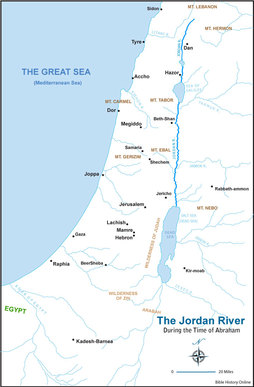 Matthew 3 - Jesus' baptism ...The Jordan River is a character itself in the Older Testament – it’s mentioned about 200 times. The river was the promise of life itself, and the Israelites were always talking about living on its banks, and hearing God promise it to them. This river is the border between foreign lands and home. It’s the boundary between the past and the future. It’s a place of abundance and refuge. It’s where Jesus will be baptized, often where he teaches, and where he goes for solace in the book of John soon before his death. It is so important to the Israelites that they tell stories of killing thousands of people to claim the riverbank. While we won’t condone the genocide, we can relate to this profound longing. We’ve all had the same need, for refuge, for home, for the promise of life, for the possibility of abundance. Crossing this river may have been so important that the Israelites wandered the wilderness for 40 years just to prepare. See there’s a funny thing about the geography of this story. Have you noticed this before? The Israelites escape slavery in Egypt and are returning to Canaan. There’s a pretty clear path between Egypt and Canaan, and it doesn’t involve crossing the Jordan. Biblical scholars believe the wilderness wandering took place over here (southeast of the Jordan and the Dead Sea). It seems the Israelites passed by their destination and twiddled their thumbs for awhile, then found a more complicated way to get home. Is this simply the result of poor planning? No GPS? I doubt it. I think, like every other detail in the stories we read in the Bible, this was a deliberate detour. Whether we ascribe it to God or the people recording the story, the 40 years in the wilderness are someone’s intent. Without these 40 years, the Israelites would never have crossed the Jordan. They still would’ve ended up on its banks, but the moment of crossing over would have been unnecessary. And this story tells us clearly that crossing the Jordan was necessary for this tired, cranky, confused band of travelers. The Israelites have to cross the river because they need a border between the old and the new. Moses, Miriam and Aaron have led them out of Egypt and through the desert, but because they wander around, all three of these essential leaders die and are buried along the way. Moses says many times that he won’t live to cross the river with the people, like in Deuteronomy 4:22 “For I am going to die in this land without crossing over the Jordan, but you are going to cross over to take possession of that good land.” Moses urges the Israelites to remember their faith in God and asks Joshua to lead them across the river. They bury Moses, and soon after, they cross the Jordan and enter the Promised Land. Lafayette Church of the Brethren doesn’t have to wander 40 years in the wilderness to prepare for the next thing, but you are also in a time of transition. As you await your next pastor, you’re not lost at all – you’re preparing for your Jordan River, your new beginning. You’re living your mission of loving like Jesus by serving others and witness for peace, you’re working on committees, you’re sharing in prayer, you’re joining your voices and spirits in song and worship. Lafayette Church of the Brethren is sharing all over this community too: food at the food pantry, presents with families through Jubilee Christmas, veggies and conversation with the neighbors, time and energy in all of the relationships you foster, and all of the ways you each live out your faith in your daily lives as vets and nurses and principals and teachers and bus drivers and famers and grandparents and aunts and secretaries and technicians and counselors and engineers. Lafayette Church of the Brethren is not wandering, and this is no wilderness! Though you’re not going to pause your journeying this summer as you live in-between pastors, this will be a time to get some rest. Summer church life is always different, people traveling in and out (even more than the rest of the year), more opportunities to gather as church outside the church building, and this summer, a variety of voices in your pulpit, bringing fresh perspectives and vitality. In the year we’ve spent together we’ve reflected on who and where we’ve been in order to discern how God is calling us to live into the future. Summer is when the earth begins bearing fruit, and this summer, as your internal and external search processes are complete, you can enjoy the fruits of your growing. The Israelites wandered the wilderness for 40 years and said goodbye to Miriam, then Aaron, then Moses. And you all know something about that – you’ve said goodbye to so many pastors over the years. Most of you have known this congregation over the sweep of at least three pastors, or as many as sixteen! I’ve seen a lot of strengths in you because of this dynamic – you know that Lafayette Church of the Brethren is not dependent on any certain person – even a pastor – to be the church. You have a true sense of shared responsibility to nurture the life of this congregation. And there are challenges to saying goodbye and hello so many times – you get worn out on the emotional work involved with all these relationships and it’s easier to relax into surface-level engagement with one another. And the easiest thing, with all the search committees and settling in work to do, to focus internally rather than externally, losing sight of mission and service. Think about the Israelites’ 40 years in the wilderness – when they say goodbye to Miriam, they just keep going, don’t stop to grieve, as far as we know, they stay fixated on their journey. And when Aaron dies they stop walking and mourn for 30 days. Then when Moses dies they mourn 30 days again, and then immediately prepare to cross the Jordan and enter the land they have been aching for, the home of their past and their destiny. We have all these options and more available to us in the midst of change. We can just keep going like nothing is happening. We can take time to reflect and grieve. We can step back and consider what we are being called to next. Think about what else we can try – picking fights with each other, finding a scapegoat for tensions, checking out and hoping that other people will figure out what needs to happen next, distract ourselves with golden calves, oh, the list is endless. All of the best and worst behavior we can think of has already happened here, it will happen again, it happened in the Israelites’ 40 years in the wilderness and after they settled in Canaan, it happened amidst Jesus’ friends and followers as they witnessed his death and wondered at his resurrection. How would you like to hold yourselves – and each other – in gracious accountability in the midst of change? How do you want the people around you to respond to you when your stress and confusion spills over into dominating discussions or tuning out when things get tough, or you pass judgment and blame on someone else? Can you picture the scene? Imagine the script? When someone else responds to you graciously, and holds you accountable for your own behaviors – what does it look like? What does it sound like? And then imagine applying the golden rule – if that’s how you would like to be treated, perhaps someone else would like to be treated similarly. So when you notice someone else acting up or acting out in stress amidst all this change, imagine offering that kind of gracious accountability to them. Though waiting can be so hard, though goodbyes might ache, though starting over with a new pastor once again is a lot of work, I believe you have what you need to not only survive, but thrive, amidst all this change. Though some days you’ll wonder why the heck you’re taking such a long route to the promised land, you have so much to see and touch and taste and learn and share along the way. God is at work in this gathered body and in each one of our bodies, setting us free from slavery, leading us to nourishment in the midst of famine, raising up new leadership, raining manna from the sky in the sunshine of this day, and the sweet hugs we get every Sunday, and the sincerity of a church that strives to love like Jesus by serving others and witnessing for peace. This is plenty of good news – but there’s more! Today we remember that Jesus returns to the Jordan River to do another new thing. Jesus is about 30 years old now, and if we were reading Matthew chronologically, we’ve barely heard anything about him since he was born and then fled to Egypt with his parents. Suddenly he’s 30 and getting baptized. And he goes to the expert – his cousin (according to tradition) John. John’s father Zacharias, the priest, has found a place in mainstream Jewish society. John flees the city’s security and seductions and lives as a hermit in the desert, eating locusts and honey and letting his hair dread. It doesn’t seem like John would be particularly popular, but Jews yearning for spiritual meaning flock to him and he begins baptizing people to symbolize repentance and forgiveness. Some of you were baptized as babies, some as adults, some not at all. In Judaism there isn’t only one baptism. The ritualistic full body immersion called the mikveh is used for converting to the faith, before entering the temple, cleansing after ejaculation, menstruation, childbirth and other times when special body fluids are released, as well as preparing objects or people for religious ceremonies. So what John and Jesus are doing isn’t a brand new thing, but it certainly is weird – and moreover, it is revolutionary. Here’s this wild man in the desert baptizing people not to go to the temple – the center of established religious and political power, but to live the lives they are drawn to. This is self-selected baptism, not ordered by a priest. And this is baptism with wild John, not an official leader from the Pharisee or Sadducee parties. That’s the power of the Jordan River – or any other border we create for ourselves – when we enter the boundary waters, we are creating a new reality. Jesus is a new kind of leader. He doesn’t ascend the mountain to speak to God in secret like Moses. Jesus wades down into the water to be with John and the yearning Jews, joining them in a ritual of repentance and forgiveness. For heaven’s sake I’m grateful to Moses and Miriam and Aaron for leading the Israelites out of slavery, but perhaps there’s a reason they couldn’t cross the Jordan and enter the promised land. It was time for a new way. And 1500 years later Jesus and John enter the Jordan to make another new way. And 2000 years later we are still making new ways, we are still crossing borders, we are still learning how to get close to God by ascending mountains, by descending into rivers, by joining one another in wet repentance and forgiveness, by looking in our own hearts to find God pulsing within us. There are plenty of Christians who struggle with this moment in the good news gospel story, because many of us don’t want to think of Jesus having any sins to repent of. I look forward to hearing what you have to say about that! What I think matters more than Jesus’s sin status is that he chooses to announce his ministry in the company of the folk who gather at the river – far from the temple or the mountaintop. Even John is offended that Jesus comes to him for baptism, saying, “You should be the one to baptize me!” We hear the same shock in Peter a couple years later when Jesus kneels to wash his feet – “no, let me wash yours!” Jesus is here to turn the world upside down, not from a comfy throne or safe distance, but in the mucky river along with the rest of us. He wades in with us in our flaws and failures, in our worries and weakness, in our longings and lapses, in our beloved brokenness. And God sees it, and calls it good. The good news gospel of Matthew says, “When all the people were being baptized, Jesus was baptized too. And as he was praying, heaven was opened and the Holy Spirit descended on him in bodily form like a dove. And her voice came from heaven: 'You are my Son, whom I love; with you I am well pleased.'" Imagine stepping foot in this building each Sunday is like dipping our toes into the Jordan River. If this building is the Jordan River, the Holy Spirit has many times taken flight in this room and expressed deep pleasure at the love and service cultivated in this place. And the Jordan River reminds us that we shouldn’t get too comfy, because you can’t step in the same river twice. Lafayette Church of the Brethren has been riding a river of change for years, and gospel good news is around each bend. Wade on in, the water’s fine! We are never alone on this journey.
0 Comments
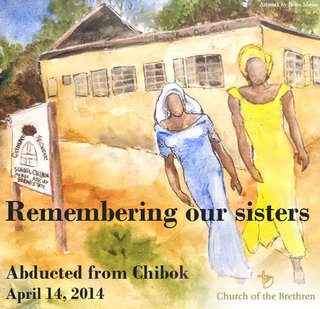 Rev 7:9-17 What do you think about the idea of “God’s chosen people?” Does that phrase swell your chest with pride, or does it make you squirm a little? Throughout the Old Testament the Hebrews, the Israelites, think of themselves as God’s chosen people. God, Yahweh, is even called “The God of the Israelites.” But that’s the same God Christians and Muslims pray to, and Christians and Muslims traditionally say that they are descendants, at least spiritually if not always genetically, of the Jews, so we assume we inherited the honor of being God’s chosen people. Does that totally satisfy you? Does it leave you wondering who has been left out? What about in current world affairs, are we God’s chosen people? A lot of Christians believe that Jesus is American and God loves the USA best and wants us to rule the world. Most Brethren haven’t thought that, but it’s a strong force in our culture – maybe some of you believe it. And I bet some of you are horrified at the thought! I am, I think it’s blasphemous, I think it’s dangerous, I think it’s idolatrous to believe that God cares about the nations and borders and countries we’ve created, especially that God would care about any of the life God created more than any other life, people more than trees, Americans more than Syrians, Christians more than Muslims. I believe that God can love every person on this planet all at once, knowing each of the hairs on each of our heads. I believe that God grieves for the people of New Orleans amidst Hurricane Katrina and the birds of the gulf amidst the latest oil spill. I believe that God can love the mosquito and me even when I’m killing the mosquito. God loves bigger, deeper, and more fully than we can ever love, than we can imagine loving, and we can just sit, stunned, in awe, and say thank you, and try to love a little bigger in our gratitude. Cause we just can’t love that way. We can’t love everyone at once. We have to pick favorites, we even have to choose sides sometimes. Our hearts aren’t infinite. I think we should stretch our hearts out, and grow our capacity to love, but not be ashamed that we have human hearts. When I was in high school I did Model UN – have any of you done it? You take on the identity of a country and practice negotiations and trade agreements and pretend to be in the UN – you learn a bunch about the world and economics and politics, and it’s a great way to develop some leadership skills. So I was in Model UN and for a weekend students from various Indiana high schools are gathered on a college campus to try to pass treaties and so forth. Sometimes in Model UN the organizers give students a challenge by announcing some breaking news, a hurricane or a pipeline burst or something, so the students have to scramble, and get creative, and work together. So in the middle of this weekend, the adults – probably college students, but adults to me – announced that there was an earthquake in India. Now this could have just been a tactic, a ploy, to get us to work harder. But it just so happened that my dad was in India, he was working with the Church of the Brethren in India, which has been in serious conflict for decades, and he was there on one of many trips he made. So when the organizers announced this earthquake I went to them to find out if this was fact or fiction. If it had been today I would’ve pulled out my phone and looked it up online. But this was 2001 and no one had cell phones, let alone smart phones, yet. So I asked them and found out that the earthquake was real, and found out it was in the area where my dad was traveling. And then I found a phone and called my mom. She hadn’t heard from him. She was calling Elgin to find out what they knew. Well, you’ve all met my dad, you know he’s fine, but we didn’t hear from him until the next day – they’d been in a car when the earthquake struck and so no buildings fell on them, they were safe. Buildings fell on many people, that’s how most people die in earthquakes, nearly 20,000 died in that earthquake in northern India in 1998. And while I was waiting to hear if my dad was okay I was checking the news and reading the death toll estimates and I was praying he wasn’t dead and suddenly I realized that if I got my prayer, my wish, my hope, and my dad was alive, then someone else was dead. Because as many as 20,000 people were dead and if my dad was alive, someone else was dead. So I felt guilty. But mostly I was afraid and wanted my dad to be okay. Because I have a human heart. I can’t love like God does. God can love each of those 20,000 people, all the injured, all the unscathed, and God loves me even as I love unequally and incompletely. As much as I’d like to reach some enlightenment and love the whole planet all at once, I can’t. I love the people closest to me the most, the people I spend the most time with, the people I’ve shared the most of myself with. I will always love them the most, I will always care more about my family and friends than I care about strangers. So when 1 person dies in a car accident in Lafayette and it’s on the front page of the paper, and 20 people are killed in a bombing in Syria and it’s tucked into some small corner in the back of the paper, I can understand. The people closest to us matter most. I can understand. And still, I worry. Because the people closest to us matter most to us, but they don’t matter most to God. They don’t actually matter more. The people close to us, the people we will never meet, each one of us, and each person in Mexico, we all matter the same amount. Do you believe it? Do you agree? If you believe it, how do you live that way? I don’t think we really can, not all the time, because our hearts don’t work that way. The people who matter most to us will seem to matter the most, in general, and then we’ll have to be reminded, by coming to church, or reading the back pages of the paper, or talking to strangers. Because the habit of our hearts is strong, it’s like gravity, and the habit of our hearts is to think the people we love matter most, and then it’s just the subtlest shift to assuming that the people who matter most to us matter most in general, or matter the most to God. But it’s not true. Everyone matters most to God. Everyone. All at once. Throughout the whole Old Testament the Israelites are wrestling with this. The habit of their hearts, too, is to think they matter most, that the people they love matter most, that they are God’s chosen people. They even come up with laws about how, since they’re God’s favorites, they should stay pure and insular from other kinds of people. Ha! Good thing we never make that mistake! Then Job comes along, and who is Job? The most faithful person in the whole world. God says Job is blameless, upright, faithful, above all others. If God is so impressed by Job, and Job is the most faithful person in the world, Job must be one of those chosen people, right? Nope. Job is an Edomite. Edomites are foreigners, the Israelites war with them. Job, the enemy of the chosen people, is the most faithful person. An Edomite. Not a chosen Israelite. An enemy.... So just in case anyone made it to the end of the New Testament still confused about who might or might not be God’s chosen people, who might or might not be beloved by God, we read in Revelation that “a great multitude that no one could count, from every nation, from all tribes and peoples and languages,” gathers to call up on God, as God’s beloved. There is no nation that God loves more than any other, there is no ethnic or cultural group that God favors above any other.... Remember 2 years ago when 276 schoolgirls were kidnapped in Chibok, Nigeria? It was always terrible, unthinkable, disgusting, terrifying. But when we Brethren in the US found out that most of these girls are Brethren, that the school these girls attended was started by the Church of the Brethren, when we found all this out, the girls’ story captivated us. And it makes sense! People are dying, being kidnapped, being tortured, every day in this world – where would we start to care? We have human hearts, not vast like God’s heart, we can only love so many people at once. We’re best at loving the people close to us, physically close to us. And the people who remind us of ourselves, like the Brethren in Nigeria, they are familiar because we share a faith, even though they are far away. Even though they may not look like us, or live like us, or talk like us, or even worship like us. We can accept our human hearts and still strive to love more vastly. We become more fully human, I believe, when we strive to become the fullest, best version of our human selves. Jesus brought God into human form to give us an example, to be our teacher. We can point ourselves toward the example of Jesus and grow to become more fully human as we follow one both human and divine. We don’t have to grieve or feel guilty that our hearts are human size. We can only love so much. Like of course it would matter more to me whether my dad survived the earthquake than someone in India who I have never met. That makes sense, and there’s no shame in my human heart’s limited ability to love. But the shame, the sin, shows up when we decide to go ahead and justify our limited caring, by thinking, well some of those Syrian refugees are Muslim, and they might hate Americans, and they might become terrorists, so I don’t need to ache for them. I can change the channel, they’re probably to blame for this civil war. Well, sometimes we will change the channel, because we can only ache so much! This world’s suffering is infinitely beyond what we can feel compassion for in any one day. But when we change the channel let’s be honest that it’s our human hearts, not someone else’s unworthiness, at play. Because we can be sure God’s love is for “a great multitude that no one could count, from every nation, from all tribes and peoples and languages,” And God’s heart is especially aching for those “who have come out of the great ordeal. For this reason they are before the throne of God,” they have come to God so that finally, “They will hunger no more, and thirst no more; the sun will not strike them, nor any scorching heat; for the Lamb at the center of the throne will be their shepherd, and he will guide them to springs of the water of life, and God will wipe away every tear from their eyes.” Amen.  Psalm 30: Weeping may linger for the night, but joy comes with the morning. ...Spring came in March, but then left again. I’m aching for the sun because when the sun returns I’ll get the fresh air I need, I’ll get the exercise I need, when the sun returns I’ll trust that life has returned. We know better, we know life is waiting all winter, that some kinds of life, like certain flower bulbs, need deep cold or they won’t flower in the spring. In this divinely designed world there is an end in every beginning, a time for every season, a purpose for everything under heaven. Thanks be to God. But what is the purpose of the latest shooting on a military base in Texas that left two dead last week? We could write a very long list this morning of the seemingly senseless and certainly heartbreaking violence, cruelty, illness, pain and fear that swirls around us and through us this spring. But our faith teaches us that even this long list has purpose. We might trust that when we look backward, but in the midst of winter, in the midst of hailstorms in a gloomy April, in the midst of a nighttime of tears, trusting the unfolding purpose of our pain and suffering isn’t obvious, it isn’t easy. When we are depleted and anxious and aching, how do we find the energy and creativity to imagine new possibilities, to see around the corner, to trust? ... My friend Ruth Johnston's beautiful poem Resurrection on the Farm speaks to this. Ruth describes the gloomy April as the time when all is hope and nothing else. When the sun doesn’t shine and all we can do is hope for it. When the cancer can’t be treated with surgery or radiation or chemo and all we can do is hope for some kind of healing. When someone we love is spiraling out of control and refuses help and all we can do is hope for some out-of-the-blue intervention or breakthrough. When we can’t change it, we can’t fix it, we can’t force what we need or want out of the world and the people around us, all we have left is hope. Well, we also have despair, depression, resentment, resignation. Those are always available to us. But when we can give up trying to control our lives we are freed up to live in hope. Thanks be to God.... How do we get from crying all night to the joy of the morning? We let go of control, of needing things to be different than they are. We release control and take hold of hope. But that doesn’t mean we’re supposed to be passive or carefree. We also do our best, we say what we need to say, we seek reconciliation, we offer our most earnest, loving selves to the world. Because when we don’t try, we end up with regret, resentment, complicated grief. Like that cliché advice for couples – never go to bed angry. That’s wise! Can you go to bed angry and wake up dancing? Some translations of the Bible call Psalm 30 a psalm of Thanksgiving for Recovery from Grave Illness. It’s a song of gratitude to God. All the psalms are, really, songs of praise to God. But some of the psalms also carry lament and anger to God. “My God, my God, why have you forsaken me” cries Jesus on the cross, and he’s singing Psalm 22. Psalm 22 is a Lament Psalm. The Lament Psalms aren’t easy to read, they can challenge our faith, they certainly shake up simplistic theology that God is good and always wants us to be happy and we should just say thank you. The Lament Psalms are packed with praise, with gratitude, but they start with pain. There’s a formula, a pattern, to Lament Psalms.
As Brethren we tend not to recite the same words over and over in worship. We don’t have a creed, we do say the Lord’s Prayer sometimes but that’s probably the only thing that all of us in this room could recite together from memory. Some short scriptures, maybe John 3:16, but I bet we couldn’t even all recite Psalm 23. And this is because we take seriously ongoing divine revelation, and discernment in community. That means, we believe that God continues to speak into this world and that we can discern God’s guidance and wisdom for our lives when we gather in community to pray, sing, worship, fellowship and serve. These are our spiritual practices, individual and communal. And we keep practicing them and have new words to say each week in worship that come from thousands of years old psalms, and from current poets. The words we share come from our ancestors’ lives and from our lives today. Thanks be to God. But we do rely on patterns, too. Think of Matthew 18:15-19, Jesus’ instructions about how to live with conflict. Just like when we’re suffering and fall back on old habits, and hopefully a lament psalm or two, when we’re in conflict we’re often anxious and angry and aren’t our most compassionate or creative. Matthew 18 gives us a pattern, a habit, to practice so faithfully that even in the midst of painful conflict we can fall back on this habit. Last week in Sunday school we talked about forgiveness, and recalled the Amish community devastated by a man coming into their school, murdering many children, and then killing himself. That very day, members of the Amish community came to his widow’s house with food and offered forgiveness and condolences. Do you think they just started thinking about forgiveness that day? Of course not. Do you think they fully felt forgiveness that day? Of course not. But they took Jesus’ teachings on forgiveness so seriously, they practiced it in daily ways, and when their lives were turned upside down by senseless violence, they had the habit of forgiveness at hand. Thanks be to God. I think the Lament Psalms are like practicing Matthew 18 with God. We don’t turn to God in prayer and pretend nothing’s wrong. That would be a shallow relationship. We demonstrate our trust in God by telling God the truth of our experience, by naming our suffering and frustration, by asking God to continue to be part of our lives. Jesus tells us that when we’re upset with each other we do the same thing – we go to one another and name what we’re experiencing. We ask for continued relationship through this conversation, as hard as it might be to have, we’re demonstrating that we trust each other enough, that we have hope in one another, when we are willing to talk things through. Thanks be to God. With all our suffering and disappointment, by practicing prayer in the best and worst of times, we can truly say Thanks be to God in our nights of weeping, our mornings of dancing, our gloomy Aprils, and the sweetest and sunniest days....  What stuff, memories, sins, resentments are you retaining? What stuff, memories, sins, resentments are you retaining? John 20:19-23 If we retain the sins of any, they are retained, Jesus tells us. Retain, retention, these aren’t big or complicated words but we don’t use them every day. What else do we talk about retaining?
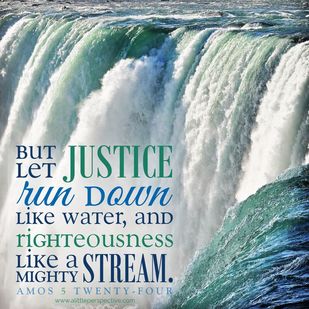 From Palm Sunday ...We’re marching into Jerusalem this Passover week, the drums of rebellion are throbbing in the hearts and streets of Jerusalem the palms are waving the people shout Hosanna to the prince of peace! It won’t be long now, it won’t be long! Til justice comes rolling like a mighty stream! Til messiah Jesus unites Israel and Judea – all twelve tribes together again! Til Jesus overturns the tables and upsets corruption and overthrows Empire! Is Jesus the one the prophets said would come? Jesus makes his own prophecies about Jerusalem The city he watches and weeps, crying, “if only you had recognized the things that make for peace! The days will come upon you when your enemies will surround you and hem you in on every side! They will not leave one stone upon another!” (Luke 19:41-44) The city Jesus says “kills the prophets and stones those who are sent to it” (Matt 23:37 and Luke 13:34) Jesus prophesies about himself, declaring his own torture and death will take place when he reaches Jerusalem. It won’t be long now, it won’t be long. And what else does he say? What does he say to us? “If any want to become my followers, let them deny themselves, take up their cross and follow me.” (Mark 8:34) A cross to carry isn’t just any burden to bear. Dying on the cross is a punishment only for insurrection, for rebellion, against Rome. Jesus doesn’t say, follow me and suffer. Jesus says, follow me and die a revolutionary. Did you wave your palm and shout Hosanna as Jesus marched into Jerusalem this morning? It won’t be long now, it won’t be long. Til Jesus reaches the Temple, Til Jesus reaches the cross. Are you still with him? Where is your cross? What table does it upset? What gap does it bridge? What wall does it topple? The table of economic exploitation? The gap between pure and impure? The wall between peasant and priest? Does your cross upset the tables piled high with sweatshop goods and the earth’s blood? The tables spread with bottles promising beauty or pills promising peace? The table of our federal taxes, 50% of which are pumped into the US military each year? Does your cross bridge the achievement gap between black and white students in IN schools? The gap between those lunching at the LUM community meal and those at La Scala? Does your cross topple the wall between the US and Mexico? The wall between Israel and Palestine? Who are you marching with? Do you stand with the power of Pilate and Rome, safe in Empire? Do you drape your coat on the dirt and wave a palm for a peasant on a colt? What revolutions do you bear on your back, hold in your heart, praise in your prayers? It won’t be long now, it won’t be long Stand and march with the peasant king Now, stand and march with the peasant king! Shout Hosanna to the prince of peace! Hosanna! It won’t be long now, it won’t be long ‘Til justice comes rolling like a mighty stream It won't be long now, it won't be long  John 12:1-8 ...We use anointing to set something – or someone – apart for God’s service. We use anointing to consecrate kings and the Messiah. Kings were anointed on their heads. Anointing Jesus’ feet could be a way of marking Jesus king of an upside down kingdom. And anointing Jesus’ head or feet is also preparation for his burial, in Matthew, Mark and John. Mark and Luke both say the oil is nard or spikenard, an essential oil harvested from the roots of the spikenard, a flowering plant that grows in the eastern Himalayas. This oil has been used medicinally for thousands of years, and was specifically used by Jews in religious ceremonies at the Temple. In the Song of Songs, or Song of Solomon 4:13-14, the bridegroom sings of spikenard: Your plants are an orchard of pomegranates With pleasant fruits, Fragrant henna with spikenard, spikenard and saffron, calamus and cinnamon, with every kind of incense tree, with myrrh and aloes, and all the finest spices. Though spikenard was used in perfume, some people say that its musty smell is unpleasant. Do you know what patchouli oil smells like? The classic hippy smell? Nard smells a bit like that, apparently. And Mary dries Jesus with her hair, so the oil, the smell, stayed with her for days. Some love the smell, others don’t, but nard has been honored for its relaxing power – for insomnia, for restless babies, for the sick and even the dying. Mary went through the days to come with the smell of nard surrounding her. Maybe it evoked the Temple for her, maybe it simply reminded her of Jesus, maybe the scent of death followed her in the days – even weeks – to come. With all the rich symbolism and power in anointing, no wonder we have these four stories of a woman anointing Jesus, each story similar, but nuanced, and all four stories carry mystery and power. Whether these four accounts describe one, two, or even more moments in time, might be one of the reasons we don’t really know what to make of these stories. But the feeding of the multitudes, or the feeding of the four thousand, five thousand (plus women and children!) shows up six times throughout the four gospels, and we invoke those stories pretty often – I think we’re more clear on what the feeding of the multitudes teaches us than what the woman anointing Jesus teaches us. Just what happened, and where, and how many times is confusing enough. But we’re also confused about what it means, and especially, what it means for how we are to live. Jesus tells us to feed the hungry, to give our outer coat when asked, and our inner coat too, Jesus requires his followers to care and share with the poor, and many of Jesus’ friends and followers ARE the poor. SO this moment of anointing means we’re left with some mystery about money, generosity, and extravagance. No black and white answers here. In Matthew’s account of the woman anointing Jesus, Jesus tells everyone in the room, “Truly I tell you, wherever this gospel is preached throughout the world, what she has done will also be told, in memory of her.” (Matthew 26:13) Well, the story in Matthew doesn’t even give her a name, so it’s hard to tell her story! The woman anointing Jesus in Mark isn’t named either. In Luke, she isn’t named, but she is described as a woman “who has lived a sinful life.” And in John she is Mary of Bethany. And she’s with Martha and Lazarus, so readers usually assume this is Mary, the sister of Martha and Lazarus. We really don’t know – maybe there are multiple Marys and Marthas and Lazaruses, but most people reading the New Testament tend to assume that Mary of Bethany, who anoints Jesus in the gospel according to John, is the sister of Martha and Lazarus, this probably being the only Lazarus raised from the dead! We don’t know exactly who she is, but we know who she is not. She’s not Mary Magdalene. Mary of Bethany is from Bethany. Mary of Magdala, Mary Magdalene, is from Magdala. What have we assumed about Mary Magdalene? About her occupation? For centuries Christians have said she was a prostitute. This is the problem with rumors – the true and false ones spread the same. The idea that Mary Magdalene was a prostitute comes from misreading the stories in Luke and John. The woman anointing Jesus in Luke isn’t named, but she’s “lived a sinful life.” Doesn’t say what sorts of sins, certainly doesn’t say she’s a prostitute, but in cultures that think of women as sex objects, which I would say ours does, it’s a common mental mistake. Women can lie on their tax returns or shoplift at Target or neglect their children, but when we hear about a “sinful woman” many of our minds go to sex because our culture invites us to think a lot about sex, and think of women as sex objects. Well, that was true for Pope Gregory the Great in the 6th century, too, apparently, since he was the one who decided that Mary Magdalene was Mary of Bethany anointing Jesus in the John and that she must also be the woman anointing Jesus in Luke, and that this sinful woman was a prostitute. Regardless of who, what, where and when, Jesus praises the woman (or women) who anointed him, and recall what he says in Matthew, “Truly I tell you, wherever this gospel is preached throughout the world, what she has done will also be told, in memory of her. She has done a beautiful thing to me.” Whether she anoints Jesus to mark him king or messiah, whether she anoints him to show he was specially marked for God’s work in this world, whether her anointing was to stifle the smell of decay that would begin days after his death, Jesus calls it beautiful. It is beautiful, maybe one of the most beautiful things, to be known. To be recognized. To be called by our name. To be understood. The woman, the women, anointing Jesus see him and understand him when others resist. She sees Jesus is specially marked for God’s work in the world, so she anoints his head. She sees Jesus ushering in an upside-down kingdom, so she anoints his feet. She sees Jesus preparing for death, so she pours oil on him in his grief and worry. She sees him and knows him.... 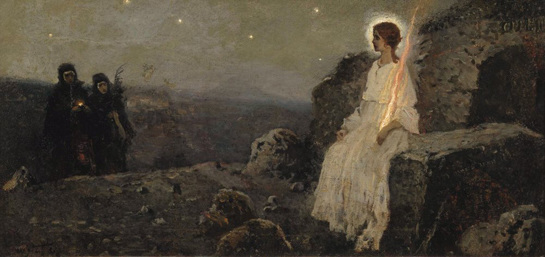 Luke 24:11 “These words seemed to them an idle tale, and they did not believe them.” ...And then two followers and friends of Jesus walk seven miles with Jesus without knowing it. On the road to Emmaus, they walk and talk with Jesus and don’t recognize him. They should know better, these friends and followers of Jesus. These disciples and apostles sure seem blind to their teacher, their rabbi, their Lord. But hindsight is 20/20. We simply can’t understand the richness of this moment until we look back on it later. As Christians, we’ve had 2000 years to get used to the idea of Jesus’ resurrection. For some of us it’s a metaphor, for some of us it’s a historical fact, for some of us it’s a mystery beyond either one. However you find meaning in the resurrection, imagine, for a moment, if you were with Mary Magdalene going to the tomb to care for Jesus’ body. You’re full of worries. How will we ever move that stone? Has his body started to smell? Will we be harassed for caring for this enemy of the Temple elite and Rome? You show up at the tomb completely unprepared for resurrection. No wonder it takes so long for Jesus’ friends and followers to believe. They aren’t ready for resurrection right away, they need some time. Where in your life are you hiding from resurrection today? What invitation to abundant life are you resisting? The question might be too hard. Hindsight is 20/20, right? Maybe we’ll only know looking back on this day, the ways that we are right now resisting coming fully to life. So look back. Do you remember as a schoolkid, a teacher who took you aside and suggested that you weren’t reaching your full potential? Maybe he said you could work more diligently on your homework, maybe she said you could pay more attention in class. At the time you might have rolled your eyes, or argued, or felt embarrassed. And maybe later you wrote that teacher a letter, or just thought about it in your mind, how much it meant that your teacher believed in you, had faith in you, saw that you could be more than you were. Maybe a parent or grandparent or aunt or uncle sat down with you and said, “I’m worried about you. I see you acting recklessly and I want you to be safe because I love you, because you matter.” Maybe at the time you were defensive, maybe you thought that person was uptight or old-fashioned. Maybe later you realized you had been out-of-control and afraid to admit it, and that someone else telling you that you were worthy of work helped you believe it. Hindsight may be 20/20, so even if we can’t see right now what resurrection we’re hiding from, we can trust that in the fullness of time we’ll look back and see that there was more abundant life available to us than we knew how to receive. Hindsight is 20/20, but faith is looking forward with the assurance that all things are working toward good, that the arc of the universe is long but it bends toward justice, that in the fullness of time we will find gifts in all that is unfolding today, because we are divinely designed to work with God to make all things new. Hindsight is 20/20 so we simply trust that right now God is inviting us to come fully to life, to live abundantly, to join Jesus in resurrection as life always wins, as love always wins. Praise God, whose invitations have no RSVP deadline. God is always, always, always overjoyed to invite us to live, abundantly. |
Archives
January 2022
|
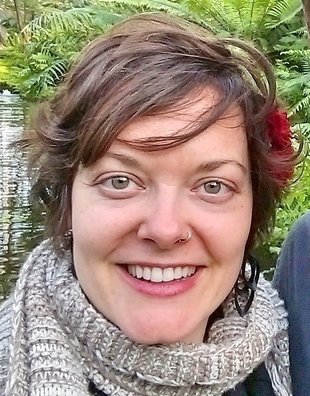
 RSS Feed
RSS Feed